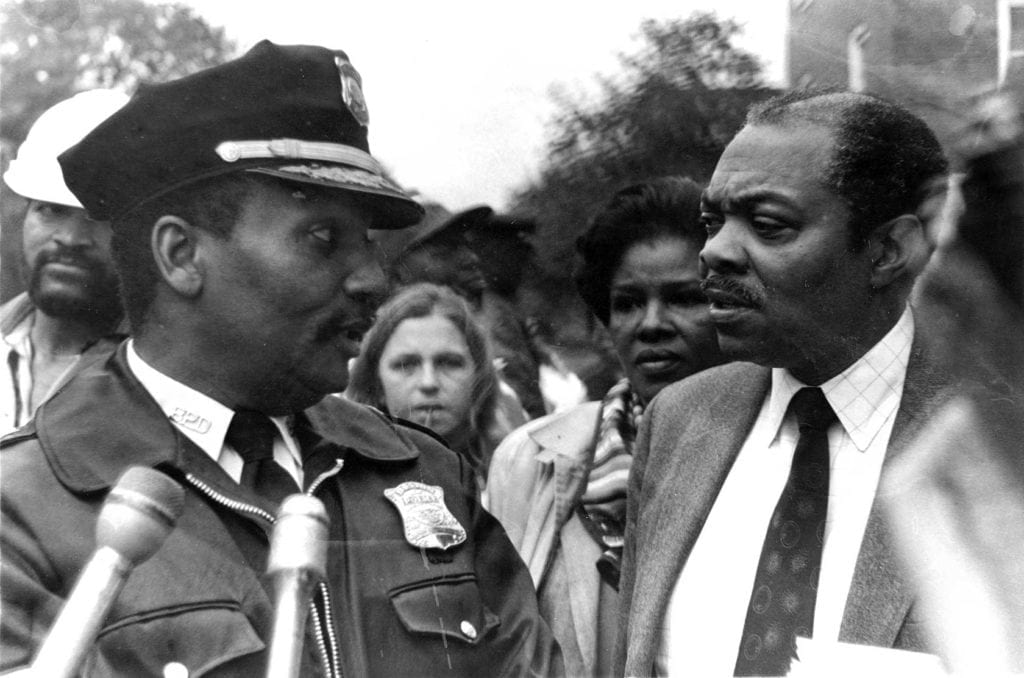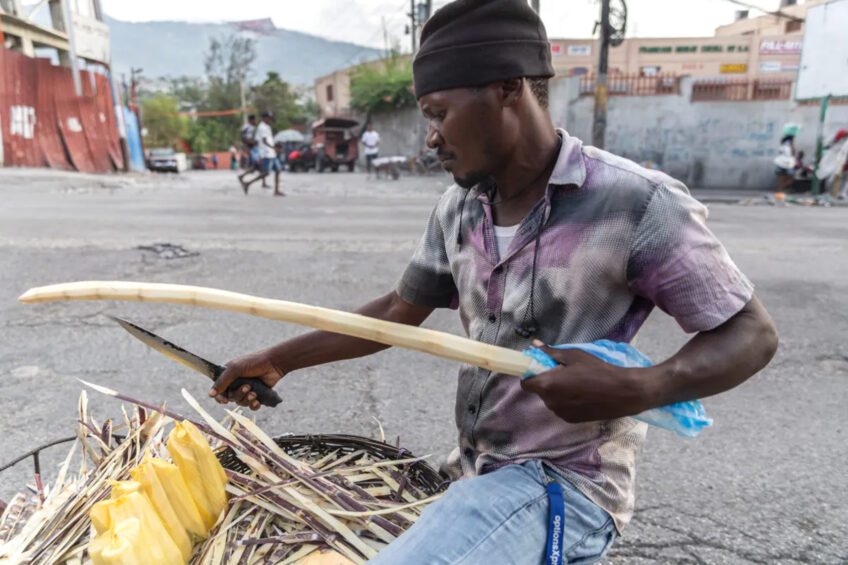
Founded in 1630, Roxbury was one of the original settlements Puritans established in the Massachusetts Bay colony. Generations of African Americans have called Roxbury home since the mid-1930s, when the city’s black population began to shift from the South End. Through the decades, Roxbury has nurtured sons and daughters who have forged lasting bonds with their neighbors and neighborhood. Below are the reminiscences of four people who grew up in Roxbury.

Sarah Ann Shaw, her daughter Klare Shaw and fellow Roxbury son Min. Louis Farrakhan at the 20th annual dinner dance and reunion of “The Over the Hill Gang,” a group of African Americans that grew up in Roxbury during the 1940s and 1950s. The event was held in 2007 at the Sheraton Boston Hotel.
photo: Del Brook E. Binns
Sarah-Ann Shaw
Sarah-Ann Shaw is a Roxbury-born journalist. After her regular appearances on “Say Brother” in 1968 she became the first female African American reporter to appear on television, working for WBZ-TV from 1969 to 2000.
As a child, Shaw lived on Monroe Street in Roxbury.
“Growing up in Roxbury was wonderful,” she says. “You knew everybody on the block. It was safe. Any adult could reprimand you, and you had to mind them.”
Shaw attended the William Boardman School, the Henry Higginson School and Girl’s Latin School.
Like many Roxbury natives, she recalls a more innocent time.
“We played games in the street,” she said.
Blacks first began moving into the area of Roxbury between Dudley Square and Franklin Park in the 1930s. From that decade until the 1960s, the neighborhood and its schools remained racially integrated.
“I look at some of my school pictures,” Shaw says. “There were as many white kids as there were black kids.”
Up through the middle of the 20th century, Roxbury residents used trolleys, buses and trains to get around the neighborhood and the city. Shaw recalls the era as a time when Roxbury was more cohesive.
“When I rode the Seaver-Humboldt streetcar, I knew everyone on the car,” she says. “Now I don’t know anyone on the bus.”
Among the more profound changes Roxbury underwent in the 20th century was the city’s urban renewal program, which saw entire sections of the neighborhood razed for redevelopment. The Bower Street area was destroyed to make way for the Washington Park Mall, built on the site where Shaw had attended the Boardman School.
The brick apartment buildings that lined Humboldt Avenue and Warren Street were razed and new housing developments such as Warren Gardens, Marksdale and Crestwood Park took their place. Many areas, such as Elmore Street and Regent Street, didn’t see redevelopment for decades. Some, like Harold Street between Waumbeck and Holworthy streets, remain vacant to this day.
The program was a failure, Shaw says.
“Urban renewal really did a job on Roxbury,” she says. “We were sold a bill of goods.”
William ‘Billy’ Celester
Billy Celester, the former commander of the Area B Boston Police substation, grew up not far from Dudley Square in the Madison Park section of Lower Roxbury. His old neighborhood, its houses and schools were leveled during urban renewal. Madison Park High School and the Madison Park housing development were constructed in the 1970s in the place of the original neighborhood.
“The Park itself was right across the street from my house,” Celester recalls. “We played basketball, softball, marbles. We had our own games that mostly took place in the park. Minister [Louis] Farrakhan lived up the street. Clarence ‘Jeep’ Jones was across the street from me. It was a poor and middle-class neighborhood.”
He adds, “It was a very close neighborhood. Everybody knew each other. People looked out for one another.”
Like many Roxbury residents, Celester recalls shopping in the Dudley Square commercial district, which then extended far beyond what is now Melnea Cass Boulevard.
“The whole of Washington Street was like downtown Boston,” he recalls. “There were fruit and vegetable stands, meat markets, clothing stores. We had Duttons, Timothy Smith. You had markets running all the way from Dudley Street to past Northampton Street.”
Recreation was an important part of life in Roxbury for young people when Celester was growing up in the 1950s and ’60s. The Boys Club and the Shaw House were two important recreational centers. Schools and churches also provided outlets for children.
“We had drum and bugle corps,” Celester says. “St. Cyprians church had a big one. We had softball and basketball teams.”
Celester attended the Sherwin and Asa Gray Schools — both long gone — before attending Boston Trade High School.

The Sherwin School was razed for the construction of the Madison Park campus. photo: Del Brook E. Binns
The handful of black police officers on the force in that era were assigned to walking beats in Lower Roxbury, Celester says. Although he sometimes engaged in youthful malfeasance, he and other Roxbury youth looked up to the black officers.
“You knew every black cop because there weren’t that many,” he said. “None of them were in cars. They all walked their beats.”
Celester joined the police force in the mid 1960s.
Danielle Williams
Danielle Williams spent much of her childhood in the Mission Hill section of Roxbury, which was predominantly Irish, before her family relocated to Monroe Street in the 1970s.
“When I moved here, I thought I had arrived,” she says. “Everybody dressed like they were on Soul Train. Saturday morning, you could hear people playing WILD. It was a whole different type of neighborhood. I was so happy to be living around black people.”
Williams recalls the annual Franklin Park Kite Festival as the unofficial start to summer. The Caribbean Carnival signaled the end of summer.
“It was a joyful time in Roxbury,” she says. “Everybody knew you. Everybody stayed connected. The community feels more disjointed now.”
Williams and others growing up on her street often walked to different parts of the neighborhood to attend block parties and sporting events, she recalls.
“I would walk up to White Stadium to watch football,” she says.
Williams attended Boston Technical High School, now the John D. O’Bryant School of Math and Science. Then, Tech was in the Townsend Street building that currently houses Boston Latin Academy, a short walk from Williams’ Monroe Street home.
“There was a strong sense of family and unity at Tech,” she says. “All the people I went to high school with, I’m still in touch with them. We’re like a family. The camaraderie and love we share to this day is part of the happiness of living in Roxbury.”
Armani White
Armani White grew up in Lower Roxbury during the 1990s and ’00s, and currently works as a youth organizer and volunteers with the anti-displacement group Reclaim Roxbury. He still lives in the neighborhood.
“l loved living in the neighborhood,” he says, recalling his childhood days. “You knew your neighbors, for better or for worse.”
While many in his generation have left the neighborhood, White chose to stay in Roxbury after graduating college.
“I have family here,” he says. “I have an appreciation for the history of this neighborhood. As a younger person, there are still a lot of opportunities in this city.”
White’s work with Reclaim Roxbury, he says, grows out of his love for the neighborhood.
“When you look at the history of black people in Boston, at least what I’ve learned from my parents, we’ve never had a passive existence. I’ve been blessed to have the opportunities I’ve had, to be able to do the work I do, pay rent and save money. I want to help others. I’ve decided I want to make the world a better place. I’d like to think I’m in a long tradition of activists.”






